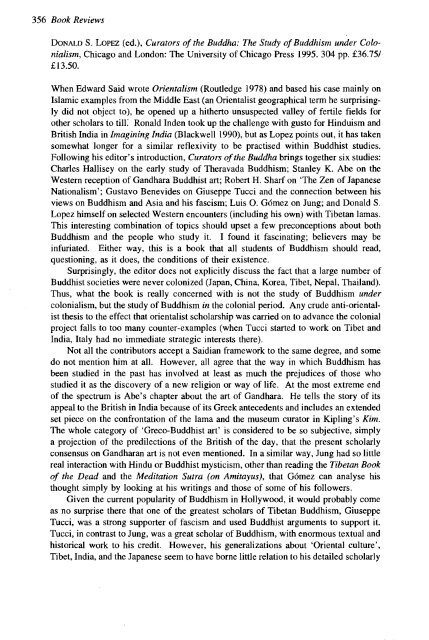godfrey lienhardt - Institute of Social and Cultural Anthropology ...
godfrey lienhardt - Institute of Social and Cultural Anthropology ...
godfrey lienhardt - Institute of Social and Cultural Anthropology ...
Create successful ePaper yourself
Turn your PDF publications into a flip-book with our unique Google optimized e-Paper software.
356 Book Reviews<br />
DONALD S. LOPEZ (ed.), Curators <strong>of</strong> the Buddha: The Study <strong>of</strong> Buddhism under Colonialism,<br />
Chicago <strong>and</strong> London: The University <strong>of</strong> Chicago Press 1995. 304 pp. £36.75/<br />
£13.50.<br />
When Edward Said wrote Orientalism (Routledge 1978) <strong>and</strong> based his case mainly on<br />
Islamic examples from the Middle East (an Orientalist geographical term he surprisingly<br />
did not object to), he opened up a hitherto unsuspected valley <strong>of</strong> fertile fields for<br />
other scholars to tilL Ronald Inden took up the challenge with gusto for Hinduism <strong>and</strong><br />
British India in Imagining India (Blackwell 1990), but as Lopez points out, it has taken<br />
somewhat longer for a similar reflexivity to be practised within Buddhist studies.<br />
Following his editor's introduction, Curators <strong>of</strong> the Buddha brings together six studies:<br />
Charles Hallisey on the early study <strong>of</strong> Theravada Buddhism; Stanley K. Abe on the<br />
Western reception <strong>of</strong> G<strong>and</strong>hara Buddhist art; Robert H. Sharf on 'The Zen <strong>of</strong> Japanese<br />
Nationalism'; Gustavo Benevides on Giuseppe Tucci <strong>and</strong> the connection between his<br />
views on Buddhism <strong>and</strong> Asia <strong>and</strong> his fascism; Luis O. G6mez on Jung; <strong>and</strong> Donald S.<br />
Lopez himself on selected Western encounters (including his own) with Tibetan lamas.<br />
This interesting combination <strong>of</strong> topics should upset a few preconceptions about both<br />
Buddhism <strong>and</strong> the people who study it. I found it fascinating; believers may be<br />
infuriated. Either way, this is a book that all students <strong>of</strong> Buddhism should read,<br />
questioning, as it does, the conditions <strong>of</strong> their existence.<br />
Surprisingly, the editor does not explicitly discuss the fact that a large number <strong>of</strong><br />
Buddhist societies were never colonized (Japan, China, Korea, Tibet, Nepal, Thail<strong>and</strong>).<br />
Thus, what the book is really concerned with is not the study <strong>of</strong> Buddhism under<br />
colonialism, but the study <strong>of</strong> Buddhism in the colonial period. Any crude anti-orientalist<br />
thesis to the effect that orientalist scholarship was carried on to advance the colonial<br />
project falls to too many counter-examples (when Tucci started to work on Tibet <strong>and</strong><br />
India, Italy had no immediate strategic interests there).<br />
Not all the contributors accept a Saidian framework to the same degree, <strong>and</strong> some<br />
do not mention him at all. However, all agree that the way in which Buddhism has<br />
been studied in the past has involved at least as much the prejudices <strong>of</strong> those who<br />
studied it as the discovery <strong>of</strong> a new religion or way <strong>of</strong> life. At the most extreme end<br />
<strong>of</strong> the spectrum is Abe's chapter about the art <strong>of</strong> G<strong>and</strong>hara. He tells the story <strong>of</strong> its<br />
appeal to the British in India because <strong>of</strong> its Greek antecedents <strong>and</strong> includes an extended<br />
set piece on the confrontation <strong>of</strong> the lama <strong>and</strong> the museum curator in Kipling's Kim.<br />
The whole category <strong>of</strong> 'Greco-Buddhist art' is considered to be so subjective, simply<br />
a projection <strong>of</strong> the predilections <strong>of</strong> the British <strong>of</strong> the day, that the present scholarly<br />
consensus on G<strong>and</strong>haran art is not even mentioned. In a similar way, Jung had so little<br />
real interaction with Hindu or Buddhist mysticism, other than reading the Tibetan Book<br />
<strong>of</strong> the Dead <strong>and</strong> the Meditation Sutra (on Amitayus), that G6mez can analyse his<br />
thought simply by looking at his writings <strong>and</strong> those <strong>of</strong> some <strong>of</strong> his followers.<br />
Given the current popularity <strong>of</strong> Buddhism in Hollywood, it would probably come<br />
as no surprise there that one <strong>of</strong> the greatest scholars <strong>of</strong> Tibetan Buddhism, Giuseppe<br />
Tucci, was a strong supporter <strong>of</strong> fascism <strong>and</strong> used Buddhist arguments to support it.<br />
Tucci, in contrast to Jung, was a great scholar <strong>of</strong> Buddhism, with enormous textual <strong>and</strong><br />
historical work to his credit. However, his generalizations about 'Oriental culture',<br />
Tibet, India, <strong>and</strong> the Japanese seem to have borne little relation to his detailed scholarly
















